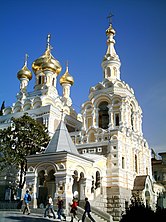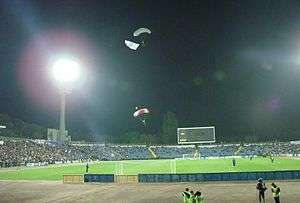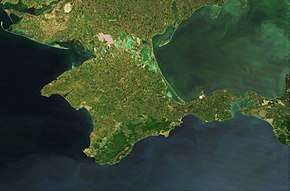Republic of Crimea
The Republic of Crimea (/kraɪˈmiːə, krɪ-/; Russian: Республика Крым, translit. Respublika Krym [rʲɪsˈpublʲɪkə krɨm]; Ukrainian: Республіка Крим, translit. Respublika Krym; Crimean Tatar: Qırım Cumhuriyeti, Къырым Джумхуриети) is a federal subject of Russia that is located on the Crimean Peninsula. The capital city and largest city within the republic is Simferopol, which is also the second largest city of Crimea, behind the federal city of Sevastopol. At the last census, the republic had a population of 1,891,465 (2014 Census).[13]
Republic of Crimea | |
|---|---|
| Республика Крым | |
| Other transcription(s) | |
| • Ukrainian | Республіка Крим |
| • Crimean Tatar | Qırım Cumhuriyeti, Къырым Джумхуриети |
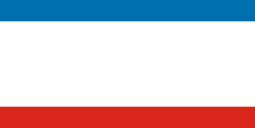 Flag  Coat of arms | |
| Anthem: "Нивы и горы твои волшебны, Родина" (Russian) Nivy i gory tvoi volshebny, Rodina (transliteration) Your fields and mountains are magical, Motherland | |
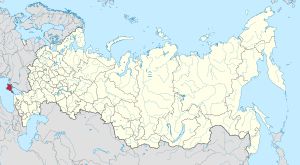 | |
.svg.png) Location of the Republic of Crimea (light yellow) in the Crimean Peninsula | |
| Coordinates: 45°24′N 35°18′E | |
| Country | Russia |
| Federal district | Southern[1][2] |
| Economic region | North Caucasus[3] |
| Established | 18 March 2014[4] |
| Capital | Simferopol |
| Government | |
| • Body | State Council |
| • Head | Sergey Aksyonov[5] |
| Area | |
| • Total | 26,100 km2 (10,100 sq mi) |
| Population | |
| • Estimate (2018)[7] | 1,913,731 |
| Time zone | UTC+3 (MSK |
| License plates | 82[9][10] |
| OKTMO ID | 35000000 |
| Official languages | Russian;[11] Ukrainian;[12] Crimean Tatar[12] |
| Website | http://rk.gov.ru/ |
The Republic of Crimea came into existence as a republic within the Russian Federation following the events of 2014: in March 2014, after the takeover of Crimea by pro-Russian separatists and the Russian Armed Forces, a referendum was held, in violation of the Ukrainian Constitution, [14][15][16] on the issue of joining Russia. The official result was that Crimeans voted overwhelmingly in support of that option.[17][18] Russia then annexed Crimea with the Republic of Crimea and Sevastopol becoming two federal subjects of Russia.[19]
Russia and 17 UN member states officially recognize Crimea as part of the Russian Federation, while Ukraine and 114 other UN member states do not. Ukraine continues to claim Crimea as an integral part of its territory as the Autonomous Republic of Crimea, supported by most foreign governments, and various United Nations General Assembly resolutions (68/262 and certain subsequent resolutions).[20][21]
History
Background
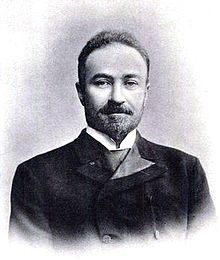
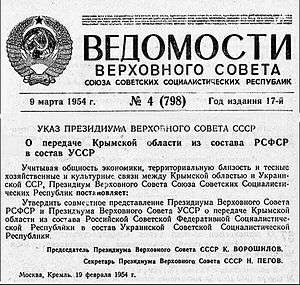
Crimea was first annexed by the Russian Empire in April 1783, under the Russian Empress Catherine the Great. While ostentibly recognised by the Ottoman Empire in December that year, the annexation sowed tensions which ultimately contributed to the outbreak of Russo-Turkish war of 1787–1792, in which the Ottoman Empire attempted to reverse it, but to no avail: the 1792 Treaty of Jassy, which formally ended the war, reaffirmed the 1783 annexation again. From 1802, Crimea constituted a southern part of the Taurida Governorate of the Russian Empire until the collapse thereof in 1917. During the Russian Civil War (1917–1921) Crimea changed hands multiple times, being inter alia the last territory held by the White Russian government in the European part of Russia in 1920, and finally became an autonomous republic within Russian Soviet Federative Socialist Republic (RSFSR) in 1921.
During World War II, in 1944, the central Soviet authorities deported the Crimean Tatars for alleged collaboration with the Nazi occupation regime; in 1945, the region was stripped of its autonomy status.
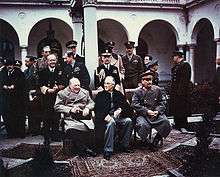
In 1954, the Presidium of the USSR Supreme Soviet transferred the region from the Russian Soviet Federative Socialist Republic to the Ukrainian Soviet Socialist Republic, another constituent republic of the USSR, then a highly centralised state, wherein borders between constituent republics was a technical issue of administration, despite the fact that Ukraine was a separate member of the UN. The Crimean Tatars were allowed to return to Crimea in the mid-1980s under perestroika.[22]
With the collapse of the Soviet Union, Crimea became part of the newly independent Ukraine, which led to tensions between Russia and Ukraine.[nb 1] With the Black Sea Fleet based on the peninsula, worries of armed skirmishes were occasionally raised. Crimean Tatars began returning from exile and resettling in Crimea. Ukraine restored Crimea's autonomous status in 1991. Crimea's autonomous status was re-affirmed in 1996 with the ratification of Ukraine's current constitution, which designated Crimea as the "Autonomous Republic of Crimea", but also an "inseparable constituent part of Ukraine".[24]
Declaration of Independence from Ukraine
On 11 March 2014, the Crimean parliament and the Sevastopol City Council jointly issued a letter of intent to unilaterally declare independence from Ukraine in the event of a 'Yes' vote in the referendum to join the region to Russia, that was to be held on 16 March.[25] The document specifically mentioned Kosovo as a precedent in the lead part.[25]
The referendum on the status of Crimea allowed citizens to vote on whether Crimea should apply to join Russia as a federal subject of the Russian Federation, or restore the 1992 Crimean constitution and Crimea's status as a part of Ukraine. The available choices did not include keeping the status quo of Crimea and Sevastopol as they were at the time the referendum was held.[26]
On 16 March 2014, according to the organizers of Crimean status referendum, a large majority (reported as 96.77% of the 81.36% of the population of Crimea who voted) voted in favour of independence of Crimea from Ukraine and joining Russia as a federal subject.[27][28] The referendum was not recognized by most of the international community and the reported results were disputed by numerous independent observers.[29][30][31][32][33] The BBC reported that most of the Crimean Tatars that they interviewed were boycotting the vote.[27] Reports from the UN criticised the circumstances surrounding the referendum, especially the presence of paramilitaries, self-defence groups and unidentifiable soldiers.[34] The European Union, Canada, Japan and the United States condemned the vote as illegal.[27][35]
After the referendum, Crimean lawmakers formally voted both to secede from Ukraine and applied for their admission into Russia. The Sevastopol City Council, however, requested the port's separate admission as a federal city.[36]
Annexation and integration to Russian Federation

On 18 March 2014, the self-proclaimed independent Republic of Crimea signed a treaty of accession to the Russian Federation. The accession was granted but separately for each the former regions that composed it: one accession for the Autonomous Republic of Crimea as the Republic of Crimea—the same name as the short-lived self-proclaimed independent republic—and another accession for Sevastopol as a federal city. The accession was only recognised internationally by a few states with most regarding the action as illegal. Ukraine refused to accept the annexation, still the Ukrainian military began to withdraw from Crimea on 19 March.[37] A transition period, during which both parties to the accession treaty were to resolve the issues of integration of the new subjects "in the economic, financial, credit and legal system of the Russian Federation", was set to last until 1 January 2015.[38]
The integration process started within days: on 24 March the Russian ruble went into official circulation with parallel circulation of the Ukrainian hryvnia permitted until 1 January 2016, however, taxes and fees were to be paid in rubles only, and the wages of employees at budget-receiving organisations were to be paid out in rubles as well.[39] On 29 March, the clocks in Crimea were moved forward to Moscow time[40] and on 31 March the Russian Prime Minister Dmitry Medvedev announced a series of programmes aimed at swiftly incorporating the territory into Russia's economy and infrastructure. The creation of a new ministry for Crimean affairs was announced too.[41] Also on 31 March, the Russian Foreign Ministry declared that foreign citizens visiting Crimea needed to apply for a visa to the Russian Federation at one of Russian diplomatic missions or its consulates.[42]
On 3 April 2014, Moscow sent a diplomatic note to Ukraine on terminating the actions of agreements concerning the deployment of the Russian Federation's Black Sea Fleet on the territory of Ukraine. As part of the agreements, Russia used to pay the Ukrainian government $530 million annually for the base, and wrote off nearly $100 million of Kiev's debt for the right to use Ukrainian waters. Ukraine also received a discount of $100 on each 1,000 cubic meters of natural gas imported from Russia, which was provided for by cutting export duties on the gas, money that would have gone into the Russian state budget. The Kremlin declared that because the base is no longer located in Ukraine, so there are no legal grounds for the discount to be continued.[43]
_13.jpg)
On 3 April 2014, Crimea and the city of Sevastopol became part of Russia's Southern Military District.[44]
On 11 April 2014, the parliament of Crimea approved a new constitution, with 88 out of 100 lawmakers voting in favor of its adoption.[45] The constitution confirms the Republic of Crimea as a democratic state within the Russian Federation and declares both territories united and inseparable. The Crimean Parliament will become smaller and have 75 members instead of the current 100.[46] According to the Kommersant newspaper, the authorities, including the State Council chair Vladimir Konstantinov,unofficially promised that certain quotas would be reserved for Crimean Tatars in various government bodies.[47] On the same day, a new revision of the Russian Constitution was officially published, with the Republic of Crimea and the federal city of Sevastopol included in the list of federal subjects of the Russian Federation.[48]
On 12 April 2014, the Constitution of the Republic of Crimea, adopted at the session of the State Council on 11 April, entered into legal force. The constitution was published by the Krymskiye Izvestiya newspaper, becoming law on the publication date, the State Council of Crimea said. The Constitution consists of 10 chapters and 95 articles; its main regulations are analogous to the articles of the Constitution of the Russian Federation. The text proclaims the Republic of Crimea is a democratic, legal state within the Russian Federation and an equal subject of the Russian Federation. The source of power in the Crimean Republic is its people, which constitutes to the multinational nation of the Russian Federation. It is noted that the supreme direct manifestation of the power of the people is referendum and free elections; seizure of power and appropriation of power authorization are unacceptable.[44]
On 15 April 2014, the Ukrainian Parliament declared Crimea and the city of Sevastopol "occupied territories".[49]
On 1 June 2014, Crimea officially switched over to the Russian ruble as its only form of legal tender.[50]
On 7 May 2015, Crimea switched its phone codes (Ukrainian number system) to the Russian number system.[51]
In July 2015, Russian Prime Minister, Dmitry Medvedev, declared that Crimea had been fully integrated into Russia.[52]
Post-annexation
After annexation, Crimean authorities started nationalization of what they called strategically important enterprises, which included not only transportation and energy production enterprises, but also, for example, a wine factory in Massandra. The enterprises which belonged to Russian citizens were nationalized against financial reimbursement, which was, however, much lower than the actual value; those which belonged to Ukrainian citizens, for example, PrivatBank owned by Ihor Kolomoyskyi or Ukrtelecom owned by Rinat Akhmetov, were expropriated without any reimbursement. The future of the nationalized enterprises is decided by the government.[53]
In July 2016 Crimea ceased to be a separate federal district of Russian Federation and was included into the Southern federal district instead.[54][55]
Government and politics
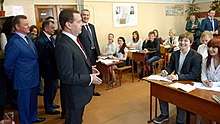
The State Council of Crimea is a legislative body with a 75-seat parliament.[56] The polling held on 14 September 2014 resulted in United Russia securing 70 of the 75 members elected.[57]
Justice is administered by courts, as part of the judiciary of Russia. Under Russian law, all decisions delivered by the Crimean branches of the judiciary of Ukraine up to its annexation remain valid.[58] This includes sentences (for "encroaching on Ukraine's territorial integrity and inviolability") for pre-2014 calls for an incorporation of Crimea into Russia.[58]
The executive power is represented by the Council of Ministers, headed either by the Prime Minister of Crimea or by the Head of the Republic of Crimea. The authority and operation of the State Council and the Council of Ministers of Crimea are determined by the Constitution of the Republic of Crimea and other Crimean laws, as well as by regular decisions carried out by the Council.[59]
Crimeans who refused to take the Russian citizenship are barred from holding government positions or municipal jobs.[60]
By July 2015, 20,000 Crimeans had renounced their Ukrainian citizenship.[61] From the time of Russia's annexation until October 2016, more than 8,800 Crimean residents received Ukrainian passports.[62]
Military
- Marine Corps of the Russia "little green men"
- Baherove (air base)
- Theodosius-13
- Southern Naval Base
Administrative divisions
The Republic of Crimea continues to use the administrative divisions previously used by the Autonomous Republic of Crimea and is thus subdivided into 25 regions: 14 districts (raions) and 11 city municipalities (gorodskoj sovet or gorsovet), officially known as territories governed by city councils.[63]
Raions
|
City municipalities
|
 |
Geography
Political geography
Crimea is one of two parts of European Russia that have no land connection to the rest of the country, the other being Kaliningrad Oblast on the Baltic Sea. In May 2015, work began on a multibillion-dollar road–rail bridge across the Kerch Strait. It is projected to be fully completed and operational by 2019.[64]
If Crimea is considered separate from Ukraine, which continues to claim sovereignty over the peninsula, then Ukraine is the only country with which it shares a land border, with a number of road and rail connections. These crossings have been under the control of Russian troops since at least mid-March 2014.
Demographics
Ethnic groups
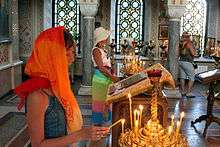
According to the 2014 Crimean Federal District census, the ethnic makeup of the population of the whole Crimean Federal District at the time comprised the following self-reported groups:
- Russians:1,188,978 (65.2%)
- Ukrainians: 291,603 (16.0%)
- Crimean Tatars: 229,526 (12.6%)
- Tatars: 42,254 (2.3%)
- Belarusians: 17,919 (1.0%)
- Armenians: 9,634 (0.5%)
According to the 2014 census, 84% of Crimean inhabitants named Russian as their native language; 7.9% named Crimean Tatar; 3.7% Tatar and 3.3% Ukrainian. The previous census was held more than decade ago in 2001, when Crimea was still controlled by Ukraine.[65]
Languages
According to the Constitution of the Republic of Crimea:[66]
Article 10
- 1. Official languages of the Republic of Crimea are Russian, Ukrainian and Crimean Tatar.
According to the Republic of Crimea Ministry of Education, Science, and Youth,[67] most primary and secondary school pupils have decided to study in Russian in 2015.
- In Russian - 96.74%
- In Crimean Tatar - 2.76%. 5083 pupils (+188 to 2014 year) study in Crimean Tatar language in 53 schools in 17 districts. There have been opened 37 the 1st grade classes of primary school.
- In Ukrainian - 0.5%. 949 pupils study in Ukrainian language in 22 schools in 13 districts. There have been opened 2 the 1st grade classes of primary school.
Its Education Minister Natalia Goncharova announced mid-August 2014 that (since no parents of first-graders wrote an application for learning Ukrainian) Crimea had decided not to form Ukrainian language classes in its primary schools.[68] Goncharova said that since more than a quarter of parents at the Ukrainian gymnasium in Simferopol had written an application to teach children in Ukrainian; this school might have Ukrainian language classes.[68] Goncharova also added that the parents of first-graders had written application for learning the Russian language, and (in areas inhabited by Crimean Tatars) for learning Crimean Tatar.[68] Goncharova stated on 10 October 2014 that at that time Crimea had 20 schools where all subjects were conducted in Ukrainian.[69]
A report (realised in the summer of 2015) of the Organization for Security and Cooperation in Europe (OSCE) claimed that the Republic of Crimea had the aim to "end the teaching of Ukrainian" by "pressure on school administrations, teachers, parents, and children".[70]
Religion
The majority of the Crimean population adheres to the Russian Orthodox Church, with the Crimean Tatars forming a Sunni Muslim minority, besides smaller Roman Catholic, Ukrainian Greek Catholic, Armenian Apostolic and Jewish minorities. In 2013, Orthodox Christians made up 58% of the Crimean population, followed by Muslims (15%, mainly Tatars) and believers without religion (10%).[71]
Economy
Peninsula economy is based on tourism, agriculture (wines, fruits, wheat, rice and further crops), fishing, pearls, mining and natural resources (mainly iron, titanium, aluminium, manganese, calcite, sandstone, quartz and silicates, amethyst, other), metallurgical and steel industry, shipbuilding and repair, oil gas and petrochemical, chemical industry, electronics and devices machinery, instruments making, glass, electronics and electric parts devices, materials and building.
Overview
In March 2014 Crimean GDP was estimated at $4.3 billion[72] or 0.2% of Russia based on current prices and 0.5% based on purchasing power parity.
After annexation of the peninsula, Russia doubled payments to about 560,000 pensioners and 200,000 public workers (in Crimea).[73] Those raises were cut back in April 2015.[74]
In June 2015 The Economist estimated that the average salary in Crimea was about two-third of the average salary in Russia.[74] According to Russian statistics by March 2015 the inflation in Crimea was 80%.[75] According to the Crimean authorities local food prices have grown 2.5 times since Russia's annexation.[76] Since then the peninsula now has to import most of its food from Russia.
Starting in the summer of 2014 Crimea's government nationalized various large Crimean companies and assets; reasons given for this were (among others) "the company helped to finance military operations against Donetsk People's Republic and Lugansk People's Republic" and "the resort complex illegally blocked public access to nearby park lands".[77] The government can nationalise assets considered to have "particular social, cultural, or historical value".[77] In the case of the Zalyv Shipbuilding yard, Crimean "self-defense" forces stormed the company's headquarters to demand nationalization.[77] Head of the Republic Sergey Aksyonov claimed that in at least one case "Employees established control of the enterprise on their own, we just helped them a little".[77] The Crimean assets of Ihor Kolomoyskyi have also been nationalized; according to Aksyonov this was "totally justified due to the fact that he is one of the initiators and financiers of the special anti-terrorist operation in the Eastern Ukraine where Russian citizens are being killed".[78][79]
By late October 2014 90% of the heads of Crimean government-owned corporation were fired as part of a supposed anti-corruption campaign, although no charges have been filed against anyone. Human rights activists in the region have described the seizures as lacking a legal basis and dismissed the "anti-corruption" rationale.[80] In June 2015 the Federal Security Service (FSB) started several anti-corruption criminal cases against high ranking Crimean officials.[81] According to Aksyonov the FSB had opened these criminal cases because it was "interested in destabilizing the situation in Crimea".[81]
On 6 May 2014 the National Bank of Ukraine ordered Ukrainian banks to cease operations in Crimea; the following weeks the Central Bank of Russia closed all Ukrainian banks in the peninsula because "they had failed to meet their obligations to creditors".[82] Eight months after the 21 March 2014 formal annexation of Crimea by Russia it became impossible for clients of Ukrainian banks to access their deposits and most of them did not pay interest (on loans).[83] A "Fund for the Protection of Depositors in Crimea", as part of Russia's Deposit Insurance Agency, was set up by Russia to compensate Crimeans.[83] By 6 November 2014 it paid out more than $500 million to 196,400 depositors; the fund has a limit of about $15,000 per bank account.[83] In July 2015, 25 banks were operating in Crimea while prior to the Russian annexation there were 180 banks.[84]
While many international businesses left the region, in 2015 only few Russian companies were reported to invest in Crimea, fearing sanctions.[73]
Under the international sanctions Crimea's once bustling IT-sector shrunk to a few IT companies.[76]
Russia invests significantly in Crimea, according to "The Federal Target Program for the Development of the Republic of Crimea and Sevastopol" they plan to invest one trillion Russian rubles (15.3 billion dollars) before 2022 [85][86] The Russian government claims that those investments are necessary because Ukrainian mismanagement of the Crimean territory caused losses b2.5 trillion Russian rubles (38,3 billion dollars) to the Autonomous Republic of Crimea and Sevastopol[87] Meanwhile, Ukraine estimates their losses due to Russian annexation of the peninsula to 100 billion dollars.[88]
Banks
- JSC GENBANK[89][90]
- JSC Bank CHBDR[91]
- Russian National Commercial Bank
Gross regional product:[92]

- Wholesale and retail trade, repair of motor vehicles, motorcycles, personal and household goods — 13%
- Transport and Telecom — 10%
- Real estate, renting and business activities — 10%
- Health care and social services — 10%
- Public administration, defense, compulsory social security — 8%
- Agriculture, hunting and forestry — 10%
- Other — 39%
Free economic zone
A Free Economic Zone has been established in the territory of the Republic of Crimea since January 1, 2015.[93]
By the end of 2017, the amount of investment in Crimea's free economic zone since early 2015, exceeded 100 billion rubles ($1.69 billion).[94]
At the beginning of 2019, 215 billion rubles ($3.3 billion) were attracted to the economy of Crimea.[95]
Tourism

In 2014 about two million tourists holidayed in Crimea, including 300,000 Ukrainians.[96] In 2013 3.5 million Ukrainian and 1.5 million Russian tourists visited Crimea.[96] Tourism is the mainstay of the Crimean economy.[96] In August 2014 Head of the Republic Aksyonov was confident that in 2015 Crimea would welcome "at least five million visitors - I have no doubts about that".[96] Early August 2015 the press service of his government stated that in 2015 2.02 million tourists had visited Crimea (16.5% more than in 2014).[97] They stated in January 2016 (that in 2015) more than 4 million tourists had vacationed in the peninsula.[98] Over 6.4 million tourists visited Crimea in 2018.[99]
Museums and art galleries
Industrial Park
Telecommunication
The internet connection goes via Krasnodar Krai. [102] Cell telecom In Crimea Peninsula worked four mobile operators already offers voice and mobile data for 2G, 3G and 4G users. []
Transport
Aviation
Simferopol is an air transport hub of the Republic of Crimea.
Rail
Trolleybus Line
Crimean trolleybus line length of 86 kilometres (53 mi) long of service «Krymtrolleybus».
Routes: Airport Simferopol — Simferopol — Alushta — Yalta
Roads
- Tavrida Highway P260: Crimean bridge — Kerch — Feodosia — Belogorsk — Simferopol — Bakhchisarai — Sevastopol.
- European route E97: Dzhankoy – Feodosiya – Kerch.
- Highway H19 (Ukraine) - Yalta – Sevastopol
- Highway M18 (Ukraine) - Yalta – Simferopol – Dzhankoy
- Highway H05 (Ukraine) - Simferopol – Simferopol International Airport – Krasnoperekopsk.
Education
- V.I. Vernadsky Crimean Federal University[103]
- Simferopol gymnasium №1
- Gymnasium 9 (Simferopol)
- Kerch Polytechnic College
Science
.jpg)
Sport
Human rights
United Nations monitors (that had been in Crimea from 2 April to 6 May 2014) said they were concerned about treatment of journalists, sexual, religious and ethnic minorities and AIDS patients.[104] The monitors had found that journalists and activists who had opposed the 2014 Crimean referendum had been harassed and abducted.[105] They also reported that Crimeans who hadn't applied for Russian citizenship faced harassment and intimidation.[104] Russia criticized the monitoring report as politically motivated and as an attempt to whitewash "the self-proclaimed Kiev authorities".[104] Russia added that it did not support the deployment of human rights monitors in Crimea.[105] The (new) Crimean authorities vowed to investigate the reports of human rights violations.[105]
According to Human Rights Watch "Russia has violated multiple obligations it has as an occupying power under international humanitarian law – in particular in relation to the protection of civilians' rights."[106][107]
In its November 2014 report on Crimea, Human Rights Watch stated that "The de facto authorities in Crimea have limited free expression, restricted peaceful assembly, and intimidated and harassed those who have opposed Russia's actions in Crimea".[108] According to the report, 15 persons went missing since March 2014; according to Ukrainian authorities 21 people disappeared.[60] Head of the Republic Sergey Aksyonov pledged to find the missing persons as well as the culprits behind the kidnappings.[60] Aksyonov regularly meets with a group of parents, whose children have gone missing, and human rights activists.[60] These parents and human rights activists have complained that rotation of the team of investigators into these missing persons has harmed these investigations.[60]
Crimean Tatars
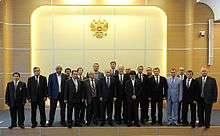
The Mejlis of the Crimean Tatar People has come under the scrutiny of the Russian Federal Security Service, which reportedly took control of the building where the Mejlis meets and searched it on 16 September 2014. Crimean Tatar media said FSB officers also searched the office of the Avdet newspaper, which is based inside the Mejlis building. Several members of the Mejlis were also reportedly subjected to FSB searches at their homes. Several Crimean Tatar opposition figures were banned from entering Crimea for five years.[109] Since Russia annexed Crimea several Crimean Tatars have disappeared or have been found dead after being reported missing.[110][111][112] Crimean authorities state these deaths and disappearances are connected to "smoking an unspecified substance" and volunteers for the Syrian civil war; human rights activists claim the disappearances are part of a repression campaign against Crimean Tatars.[107][110][111]
In February 2016 human rights defender Emir-Usein Kuku from Crimea was arrested and accused of belonging to the Islamist organization Hizb ut-Tahrir although he denies any involvement in this organization. Amnesty International has called for his immediate liberation.[113][114]
In May 2018 Server Mustafayev, the founder and coordinator of the human rights movement Crimean Solidarity was imprisoned by Russian authorities and charged with "membership of a terrorist organisation". Amnesty International and Front Line Defenders demand his immediate release.[115][116]
International status
The status of the republic is disputed as Russia and some other states recognised the independence declared by the Autonomous Republic and Sevastopol and their subsequent incorporation into the Russian Federation. Most other nations do not recognise these actions due to the Russian military intervention that occurred as these events unfolded. Russia argues that the results of a referendum held in Crimea and Sevastopol justify the accession. In the West, Russia's actions have been widely condemned as a violation of sovereignty of Ukraine and as an act of aggression. Ukraine still considers both the Autonomous Republic and Sevastopol as subdivisions of Ukraine under Ukrainian territory and subject to Ukrainian law. According to some unverified media reports, the Ukrainian government however has allegedly discontinued supplying the region with water through the North Crimean Canal.
The official line of the US, EU and Australia is that they don't grant visas to Crimeans with Russian passports.[74][117] Nevertheless, Russian media claims Crimeans get visas for some EU countries.[118][119]
On 21 March 2014, Armenia recognised the Crimean referendum, which led to Ukraine recalling its ambassador to that country.[120] The unrecognized Nagorno-Karabakh Republic also recognised the referendum earlier that week on 17 March.[121] On 22 March 2014, President Hamid Karzai of Afghanistan told a U.S. delegation that he recognised and supported the Crimean referendum and "respects the free will of the people of Crimea and Sevastopol to decide their own future".[122] On 23 March 2014, Belarus recognised Crimea as de facto part of Russia.[123] On 27 March 2014, Nicaragua unconditionally recognised the incorporation of Crimea into Russia.[124]
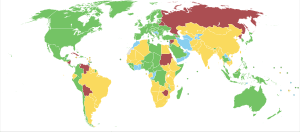
In favour Against Abstentions Absent
On 27 March 2014, the UN General Assembly voted on a non-binding resolution claiming that the referendum was invalid and reaffirming Ukraine's territorial integrity, by a vote of 100 to 11, with 58 abstentions and 24 absent.[125][126] Australia, Canada, Chile, France, Germany, Italy, Indonesia, Japan, Mexico, United Kingdom, United States and other 89 countries voted for; Armenia, Belarus, Bolivia, Cuba, North Korea, Nicaragua, Sudan, Syria, Venezuela and Zimbabwe, as well as Russia, voted against.[127] Among the abstaining countries were China, India, and Brazil; Israel was among the countries listed as absent. RT reported that Western countries resorted to "political blackmail and economic threats" to coerce diplomats to vote for the resolution,[128] whereas Reuters reported unnamed UN diplomats saying the Russian delegation threatened with punitive action against certain Eastern European and Central Asian countries if they supported the resolution.[129]
See also
Notes
References
- "Crimea becomes part of vast Southern federal district of Russia". Ukraine Today. 28 July 2016. Archived from the original on 29 July 2016. Retrieved 28 July 2016.
- Президент Российской Федерации. Указ №849 от 13 мая 2000 г. «О полномочном представителе Президента Российской Федерации в федеральном округе». Вступил в силу 13 мая 2000 г. Опубликован: "Собрание законодательства РФ", No. 20, ст. 2112, 15 мая 2000 г. (President of the Russian Federation. Decree #849 of May 13, 2000 On the Plenipotentiary Representative of the President of the Russian Federation in a Federal District. Effective as of May 13, 2000.).
- Госстандарт Российской Федерации. №ОК 024-95 27 декабря 1995 г. «Общероссийский классификатор экономических регионов. 2. Экономические районы», в ред. Изменения №5/2001 ОКЭР. (Gosstandart of the Russian Federation. #OK 024-95 December 27, 1995 Russian Classification of Economic Regions. 2. Economic Regions, as amended by the Amendment #5/2001 OKER. ).
- "Putin reveals secrets of Russia's Crimea takeover plot". BBC. 9 March 2015. Retrieved 3 August 2016.
Crimea was formally absorbed into Russia on 18 March, to international condemnation, after unidentified gunmen took over the peninsula.
- "Crimea Deputies Back Acting Leader Sergei Aksyonov to Head Republic - News". The Moscow Times.
- Федеральная служба государственной статистики (Federal State Statistics Service) (21 May 2004). "Территория, число районов, населённых пунктов и сельских администраций по субъектам Российской Федерации (Territory, Number of Districts, Inhabited Localities, and Rural Administration by Federal Subjects of the Russian Federation)". Всероссийская перепись населения 2002 года (All-Russia Population Census of 2002) (in Russian). Federal State Statistics Service. Retrieved 1 November 2011.
- "26. Численность постоянного населения Российской Федерации по муниципальным образованиям на 1 января 2018 года". Federal State Statistics Service. Retrieved 23 January 2019.
- "Об исчислении времени". Официальный интернет-портал правовой информации (in Russian). 3 June 2011. Retrieved 19 January 2019.
- "Order of Interior Ministry of Russia №316". Interior Ministry of Russia. Retrieved 11 April 2014.
- Для крымских автомобилистов приготовили новые номера. Segodnya (in Russian). 2 April 2014. Archived from the original on 6 July 2015. Retrieved 6 July 2015.
- Official throughout the Russian Federation according to Article 68.1 of the Constitution of Russia.
- "Putin addresses Russia's parliament in Crimea". al Jazeera.
- Russian Federal State Statistics Service (2014). "Таблица 1.3. Численность населения Крымского федерального округа, городских округов, муниципальных районов, городских и сельских поселений" [Table 1.3. Population of Crimean Federal District, Its Urban Okrugs, Municipal Districts, Urban and Rural Settlements]. Федеральное статистическое наблюдение «Перепись населения в Крымском федеральном округе». ("Population Census in Crimean Federal District" Federal Statistical Examination) (in Russian). Federal State Statistics Service. Retrieved 4 January 2016.
- КС признал неконституционным постановление крымского парламента о вхождении АРК в состав РФ и проведении референдума о статусе автономии [Constitutional Court of Ukraine deemed Crimean parliament resolution on accession of the Autonomous Republic of Crimea to the Russian Federation and holding of the Crimean status referendum unconstitutional] (in Russian). Interfax-Ukraine. 14 March 2014.
- Tokarev, Alexey (2014). Электоральная история постсоветского Крыма: от УССР до России [The electoral history of the post-Soviet Crimea: from Ukrainian SSR to Russia] (PDF). MGIMO Review of International Relations (in Russian). 5 (44): 32–41.
Спустя 22 года и 364 дня после первого в СССР референдума в автономной республике Украины Крым состоялся последний референдум. Проводился он вопреки украинскому законодательству, не предусматривающему понятия региональный референдум и предписывающему решать территориальные вопросы только на всеукраинском референдуме
- Marxen, Christian (2014). "The Crimea Crisis – An International Law Perspective" (PDF). Zeitschrift für ausländisches öffentliches Recht und Völkerrecht (Heidelberg Journal of International Law). 74.
Organizing and holding the referendum on Crimea's accession to Russia was illegal under the Ukrainian constitution. Article 2 of the constitution establishes that "Ukraine shall be a unitary state" and that the "territory of Ukraine within its present border is indivisible and inviolable". This is confirmed in regard to Crimea by Chapter X of the constitution, which provides for the autonomous status of Crimea. Article 134 sets forth that Crimea is an "inseparable constituent part of Ukraine". The autonomous status provides Crimea with a certain set of authorities and allows, inter alia, to hold referendums. These rights are, however, limited to local matters. The constitution makes clear that alterations to the territory of Ukraine require an all-Ukrainian referendum.
- "Crimea 'votes to rejoin Russia' after controversial poll". ITV. 16 March 2014. Retrieved 26 November 2017.
- "Crimea applies to be part of Russian Federation after vote to leave Ukraine". The Guardian. 17 March 2014.
- Распоряжение Президента Российской Федерации от 17 March 2014 № 63-рп "О подписании Договора между Российской Федерацией и Республикой Крым о принятии в Российскую Федерацию Республики Крым и образовании в составе Российской Федерации новых субъектов" [Order of the President of the Russian Federation of 17 March 2014 number № 63 "On signing the Treaty between the Russian Federation and the Republic of Crimea on the acceptance of the Republic of Crimea into the Russian Federation and the formation of new subjects in the Russian Federation"] (in Russian). The Russian Federation's official internet-portal of legal information. 18 March 2014. Archived from the original on 18 March 2014.
- "Kremlin: Crimea and Sevastopol are now part of Russia, not Ukraine". CNN. 18 March 2014.
- "UN officially recognized Russia as an occupying power in Crimea". Euromaidan Press. 20 December 2016.
- "The Crimean Tatars began repatriating on a massive scale beginning in the late 1980s and continuing into the early 1990s. The population of Crimean Tatars in Crimea rapidly reached 250,000 and leveled off at 270,000 where it remains as of this writing [2001]. There are believed to be between 30,000 and 100,000 remaining in places of former exile in Central Asia." Greta Lynn Uehling, The Crimean Tatars (Encyclopedia of the Minorities, Chicago: Fitzroy Dearborn) iccrimea.org
- (in Ukrainian) Майже 60% росіян вважають, що Крим - це Росія Almost 60% of Russians believe, that Crimea - is Russian, Ukrayinska Pravda (10 September 2013)
- "Constitution of Ukraine, 1996". Retrieved 12 March 2014.
- "Парламент Крыма принял Декларацию о независимости АРК и г. Севастополя". Государственный Совет Республики Крым. 11 March 2014. Archived from the original on 11 March 2014. Retrieved 18 March 2014.
- "При воссоединении с Россией крымчане дискомфорта не почувствуют! - Krym Info". Krym Info. Retrieved 25 September 2014.
- "Crimea referendum: Voters 'back Russia union'". BBC News.
- "Crimeans vote over 90 percent to quit Ukraine for Russia". Reuters. 16 March 2014.
- "OSCE says Crimea referendum illegal". Refworld. 11 March 2014. Retrieved 18 February 2020.
- Pifer, Steven (18 March 2019). "Five years after Crimea's illegal annexation, the issue is no closer to resolution". Brookings Institution. Retrieved 18 February 2020.
- Rayman, Noah (27 March 2014). "UN General Assembly: Crimea Referendum Was Illegal". Retrieved 18 February 2020.
- "Ukraine crisis: 'Illegal' Crimean referendum condemned". BBC News. 6 March 2014. Retrieved 18 February 2020.
- Bellinger III, John B. "Why the Crimean Referendum Is Illegitimate". Council on Foreign Relations. Retrieved 18 February 2020.
- "UN report on Euronews - 15 April 2014". Euronews. 11 March 2014. Retrieved 16 April 2014.
- "Japan does not recognise Crimea vote - govt spokesman". Reuters. 17 March 2014.
- Herszenhorn, David M.; Cowell, Alan (17 March 2014). "Lawmakers in Crimea Move Swiftly to Split From Ukraine". The New York Times. Retrieved 17 March 2014.
- Carol Morello and Kathy Lally (19 March 2014). "Ukraine says it is preparing to leave Crimea". The Washington Post.
- "Treaty to accept Crimea, Sevastopol to Russian Federation signed". Russia Today. 18 March 2014.
- "TASS: Russia - Russian ruble goes into official circulation in Crimea as of Monday". TASS.
- "Ukraine crisis: Crimea celebrates switch to Moscow time". BBC News. 29 March 2014. Retrieved 29 March 2014.
- Lukas I. Alpert, Alexander Kolyandr. "Medvedev visits Crimea, vows development aid". Market Watch.
- "Now foreigners need Russian visas to visit Crimea - Russian Foreign Ministry". voiceofrussia.com.
- Sputnik (3 April 2014). "Moscow Sent Diplomatic Note to Ukraine on Terminating Black Sea Fleet Agreements". ria.ru.
- Sputnik. "Sputnik International - Breaking News & Analysis - Radio, Photos, Videos, Infographics". sputniknews.com.
- Sputnik (11 April 2014). "Crimean Parliament Approves New Constitution". ria.ru.
- "Crimea approves new Constitution". PravdaReport.
- "Crimea's new constitution put up for discussion". RT English.
- Sputnik (11 April 2014). "Russia Amends Constitution to Include Crimea, Sevastopol". ria.ru.
- Sputnik (15 April 2014). "Ukraine's Parliament Declares Crimea, Sevastopol 'Occupied Territory'". ria.ru.
- Verbyany, Volodymyr (1 June 2014). "Crimea Adopts Ruble as Ukraine Continues Battling Rebels". Bloomberg.
- Crimea switches to Russian telephone codes, Interfax-Ukraine (7 May 2015)
- Jess McHugh (15 July 2015). "Putin Eliminates Ministry Of Crimea, Region Fully Integrated Into Russia, Russian Leaders Say". International Business Times. Retrieved 10 January 2016.
- Sambros, Andrey (27 February 2015). "Изображая Чавеса: чем закончился год национализаций в Крыму". carnegie.ru. Retrieved 3 January 2016.
- "Crimea becomes part of vast Southern federal district of Russia". Retrieved 29 July 2016.
- "Крым, который лопнул. Как Путин снова обманул полуостров". 29 July 2016. Retrieved 29 July 2016.
- "Archived copy". Archived from the original on 18 March 2014. Retrieved 18 March 2014.CS1 maint: archived copy as title (link)
- "Election Victories Strengthen Putin's Grip Around Russia and Crimea". nytimes.com. 14 September 2014. Retrieved 16 April 2016.
- Pro-Russian Activist Falls On Hard Times In Annexed Crimea, Radio Free Europe (16 January 2016)
- "Autonomous Republic of Crimea – Information card". Cabinet of Ministers of Ukraine. Retrieved 22 February 2007.
- Ukraine human rights 'deteriorating rapidly', Al Jazeera (3 December 2014)
Disappearing Crimea's anti-Russia activists , Al Jazeera - Thomas de Waal. "The New Siege of Crimea". Carnegie Endowment for International Peace.
- (in Ukrainian) Nearly 9 thousand Crimean residents received Ukrainian passports after annexation, Ukrayinska Pravda (16 October 2016)
- "Infobox card – Avtonomna Respublika Krym". Verkhovna Rada of Ukraine (in Ukrainian). Archived from the original on 1 October 2007. Retrieved 23 February 2007.
- "Putin orders military exercise as protesters clash in Crimea". reuters. 18 April 2016. Retrieved 2 May 2016.
- "Census of the population is transferred to 2016". Dzerkalo Tzhnia (in Ukrainian). 20 September 2013. Retrieved 7 March 2014.
- http://crimeaconstitution.ru/glava1/
- "На крымско-татарском и украинском языках в Крыму обучаются чуть более 3% детей — Министерство образования, науки и молодежи Республики Крым - Правительство Республики Крым". rk.gov.ru.
- (in Ukrainian) Crimea has no longer Ukrainian classes, Ukrayinska Pravda (14 August 2014)
- (in Russian) In Crimea, Ukrainian schools left - "Minister of Education", UNIAN (10 October 2014)
- Two Years After Annexation, Crimeans Wait On Russia's Unfulfilled Promises, Radio Free Europe (18 March 2016)
- "Public Opinion Survey Residents of the Autonomous Republic of Crimea" (PDF)., The sample consisted of 1,200 permanent Crimea residents older than the age of 18 and eligible to vote and is representative of the general population by age, gender, education and religion.
- "Crimea's economy in numbers and pictures". RT English.
- "In Crimea, cash is king". gulfnews.com.
- "Bad_Memory". The Economist. 11 June 2015.
- Dreams in Isolation: Crimea 2 Years After Annexation, The Moscow Times (18 March 2016)
- Alexey Eremenko. "Crimea One Year After Russia Referendum Is Isolated From World". NBC News.
- Russia Delivers a New Shock to Crimean Business: Forced Nationalization, Bloomberg News (18 November 2014 )
- "Kolomoyskyi's assets to be nationalized in Crimea (Sergey Aksyonov)". ceeinsight.net. 5 September 2014.
- Ukrainian tycoon’s estate in Crimea sold for $18 mln, Russian News Agency TASS (3 February 2016)
- Crimea’s rapid Russification means pride for some but perplexity for others, Guardian Weekly (11 November 2014)
- "The Moscow Times — News, Business, Culture & Events". Themoscowtimes.com. 7 July 2016. Retrieved 12 April 2017.
- Six More Ukrainian Banks Expelled from Crimea, Moscow Times (13 May 2014)
- Months After Russian Annexation, Crimeans Ask: 'Where Is Our Money?', Moscow Times (20 November 2014)
- (in Ukrainian) Grey financial zone: why with annexed the Crimea are Russian banks, Deutsche Welle (2 August 2015)
- "ФЦП развития Крыма и Севастополя увеличили почти до триллиона". Российская газета (in Russian). Retrieved 11 August 2019.
- "Crimea - Federal Target Program | Investment portal of the Republic of Crimea". invest-in-crimea.ru. Retrieved 11 August 2019.
- правды», Галина КОВАЛЕНКО | Сайт «Комсомольской (28 June 2019). "Украина за 23 года нанесла Крыму ущерб на 2,5 триллиона рублей". KP.RU - сайт «Комсомольской правды» (in Russian). Retrieved 11 August 2019.
- "Ukrainian Ministry of Justice: Ukraine lost $100 billion due to the annexation of the Crimea". Uawire. 23 February 2017.
- "Company Overview of JSC GENBANK". www.bloomberg.com. Retrieved 8 May 2019.
- "Genbank | Банки.ру". www.banki.ru. Retrieved 2 September 2019.
- "Bank CHBDR | Банки.ру". www.banki.ru. Retrieved 2 September 2019.
- "Republic of Crimea Industries". www.investinregions.ru. Retrieved 4 May 2019.
- "Free Economic Zone | Investment portal of the Republic of Crimea". invest-in-crimea.ru. Retrieved 30 April 2019.
- "Investments in Crimea's free economic zone exceed $1.69 bln — region's head". TASS (in Russian). Retrieved 30 April 2019.
- "Over 100 agreements worth $3.3 bln signed at Yalta forum, says Crimean leader". TASS (in Russian). Retrieved 2 May 2019.
- Tourism takes a nosedive in Crimea, BBC News (7 August 2014)
Russia's takeover of Crimea is killing tourism industry, Kyiv Post (14 August 2014) - (in Russian) In Crimea, we saw an increase in tourist traffic as compared to the year 2014, Radio Free Europe (2 August 2015)
- (in Ukrainian) Crimea - Aksenov predicts "huge flow of tourists" and operators - appreciation, Ukrayinska Pravda (19 January 2016)
- "Over 6.4 mln tourists visit Crimea in 2018". TASS. Retrieved 3 September 2019.
- "The construction of the industrial park "Feodosia" starts in June 2018 | Investment portal of the Republic of Crimea". invest-in-crimea.ru. Retrieved 30 April 2019.
- "RUB 800 Million to be Invested into Creation of the Logistics Hub in Crimea". eng.kr82.ru. Retrieved 30 April 2019.
- "Crimeans are now using the Russian internet". Retrieved 2 August 2014.
- "About university". Crimean Federal University. Retrieved 30 April 2019.
- "U.N. monitors warn on human rights in east Ukraine, Crimea". Reuters. Archived from the original on 18 May 2014.
- Cumming-Bruce, Nick (15 April 2014). "U.N. Cites Abuses in Crimea Before Russia Annexation Vote" – via NYTimes.com.
- "Crimean Tatars: Human Rights Watch Publishes Report Detailing Serious Human Rights Abuses". Unrepresented Nations and Peoples Organization. Retrieved 27 November 2014.
- "Rights in Retreat: Abuses in Crimea". Human Rights Watch. 17 November 2014. Retrieved 2 September 2015.
- Russia Abusing Rights in Annexed Crimea, Human Rights Watch Says, Bloomberg News (17 November 2014)
Human Rights Watch releases damning report on Crimea, Kyiv Post (18 November 2014) - "Russian FSB surrounds Crimean Tatar parliament-UPDATED". World Bulletin. 16 September 2014. Retrieved 16 September 2014.
- "Missing Crimean Tatar Reportedly Found Dead". RadioFreeEurope/RadioLiberty.
- "Crimea: Enforced Disappearances". Human Rights Watch. 7 October 2014. Retrieved 2 September 2015.
- Кримського татарина, який зник після анексії, знайдено мертвим [The Crimean Tartar, who disappeared after the annexation, was found dead]. Ukrayinska Pravda (in Ukrainian). 28 October 2017. Retrieved 28 October 2017.
- "Jailed Crimean Tatar Human Rights Activist on Hunger Strike in Russian World Cup city". Kharkiv Human Rights Protection Group. 4 July 2018. Retrieved 18 October 2019.
- "CRIMEAN TATAR: NEVER SILENT IN THE FACE OF INJUSTICE". Amnesty International. February 2018. Retrieved 18 October 2019.
- "RUSSIAN FEDERATION/UKRAINE: FURTHER INFORMATION: RIGHTS DEFENDER FACING TRUMPED-UP CHARGES: SERVER MUSTAFAYEV".
- "ARREST OF SERVER MUSTAFAYEV".
- "Crimean residents may not be able to visit Western countries using Russian passports". uatoday.tv.
- "TASS: Russia - Crimean citizens get Schengen visas in Moscow despite EU ban". TASS.
- "Греция выдаст крымчанам шенгенские визы". Горящие туры в Египет, туры в Турцию, Грецию. Скидки. Поиск туров - Турскидки.ру.
- "Ukraine Recalls Ambassador to Armenia over Crimea Recognition". Asbarez Armenian News. 21 March 2014.
- "Karabakh Foreign Ministry Issues Statement on Crimea". Asbarez Armenian News. 17 March 2014.
- "Afghanistan respects Crimea's right to self-determination – Karzai". Russia Today. 22 March 2014.
- "Belarusian president: Crimea is de facto part of Russia". Russia Today. 23 March 2014.
- "Nicaragua unconditionally recognises incorporation of Crimea into Russia". The Voice of Russia. 27 March 2014.
- "United Nations News Centre". UN News Service Section. 27 March 2014.
- "U.N. General Assembly declares Crimea secession vote invalid". Reuters. 27 March 2014.
- "UN Gen Assembly adopts resolution backing Ukraine's territorial integrity". RT English.
- "UN vote shows Russia far from isolated – Churkin". RT English.
- Charbonneau, Louis (28 March 2014). "Russia Threatened Countries Ahead Of UN Vote On Ukraine, Diplomats Say". The Huffington Post. Retrieved 28 March 2014.
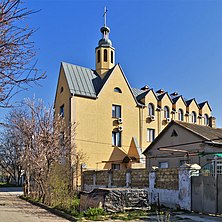
.jpg)
